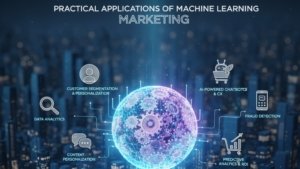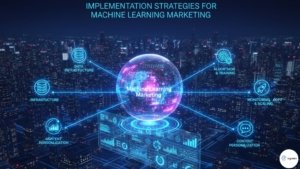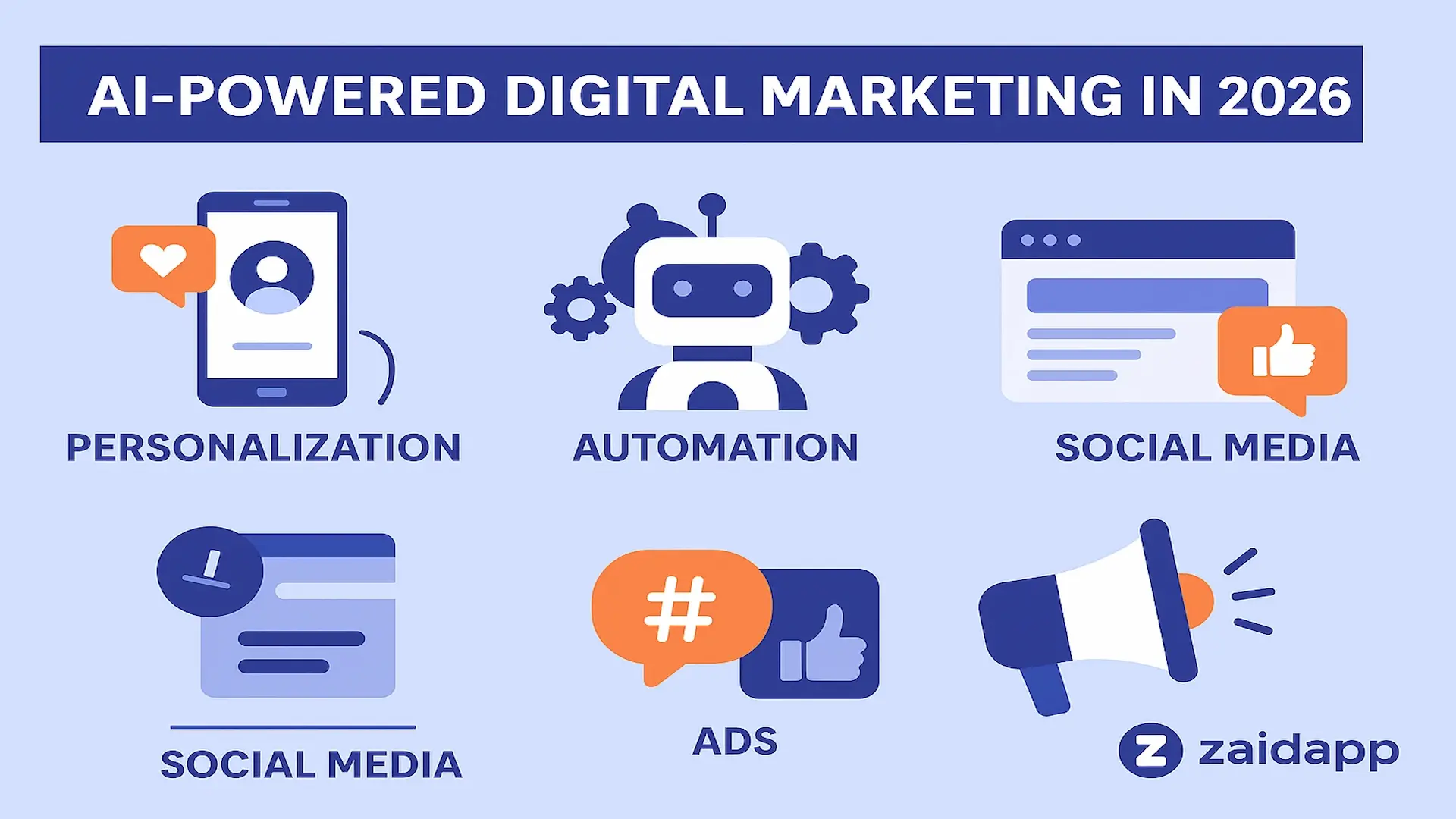The digital marketing world has experienced a dramatic transformation with the rise of artificial intelligence and machine learning. Machine learning marketing has become a central pillar of modern business strategy, allowing brands to design highly personalized, data-driven campaigns that achieve exceptional results. As we move through 2025, companies that adopt machine learning marketing are seeing rapid growth, while those slow to embrace this shift are finding it harder to stay competitive in an increasingly advanced marketplace.
Table of Contents
Understanding the Foundation of Machine Learning Marketing
Machine learning marketing represents a major shift from traditional marketing methods to intelligent, automated systems that learn from data patterns and customer behavior. Unlike conventional approaches that rely heavily on human intuition and broad demographic assumptions, this approach uses advanced algorithms to analyze large volumes of customer data, uncover patterns, and make real-time decisions that improve marketing performance.
At its core, this technology continuously learns and improves through every customer interaction. These systems process millions of data points—such as browsing activity, purchase history, social media engagement, email responses, and demographic details—to build evolving customer profiles. This adaptive capability ensures marketing strategies remain relevant and effective as preferences and market conditions change.
Fundamentally, machine learning–driven marketing transforms raw data into actionable insights that guide strategic decisions. Using techniques such as supervised, unsupervised, and reinforcement learning, it identifies patterns often missed by human analysis. As a result, organizations can predict customer behavior, optimize campaigns, and deliver personalized experiences at scale, enabling smarter and more sustainable growth.
The Evolution and Current State of Machine Learning Marketing

Key Components and Technologies in Machine Learning Marketing
Predictive Analytics and Customer Behavior Modeling
Predictive analytics sits at the heart of modern machine learning marketing, turning historical customer data into forecasts about future actions. By analyzing past behaviors, these systems can anticipate what customers might want next—sometimes even before customers realize it themselves. Machine learning marketing platforms use predictive models to determine which users are most likely to purchase, disengage, or respond to specific types of content, allowing marketers to act with precision rather than guesswork.
As technology advances, predictive models in machine learning marketing have become increasingly sophisticated. Techniques like neural networks and ensemble learning help process complex, multi-layered datasets to estimate customer lifetime value, ideal engagement timing, and product preferences. With these insights, marketing teams can focus their budgets and strategies where they’ll have the greatest impact, delivering campaigns that feel timely and highly relevant to each audience segment.
Natural Language Processing and Content Optimization
Natural Language Processing (NLP) has transformed how machine learning marketing systems interpret and communicate with audiences. Through NLP, platforms can analyze customer reviews, social media conversations, and support interactions to uncover sentiment, intent, and emerging trends. This deeper understanding helps brands refine messaging and respond more effectively to customer needs.
Many machine learning marketing tools now also use generative AI to create personalized content at scale. From tailored email subject lines and product descriptions to customized social media captions, these systems adapt language and tone to match individual preferences. The result is communication that feels more human and engaging, even when delivered automatically.
Computer Vision and Visual Marketing
Computer vision is expanding the visual dimension of machine learning marketing by enabling systems to interpret images and videos. Brands can analyze visual content shared on social media, detect brand mentions within images, and evaluate which types of visuals drive the most engagement. This allows marketers to design visual strategies that better align with audience interests and behaviors.
Another powerful application is visual search. With machine learning marketing technologies, customers can upload a photo to find similar products, removing the need for text-based searches. This feature has reshaped e-commerce experiences, making product discovery faster, more intuitive, and more aligned with how people naturally explore visual information online.
Practical Applications of Machine Learning Marketing

Customer Segmentation and Personalization
One of the standout strengths of machine learning marketing is its ability to move far beyond basic demographic segmentation. Instead of grouping customers only by age, gender, or location, these systems analyze behavior, purchase patterns, browsing habits, and engagement history to form dynamic audience segments. These segments continuously evolve as new data flows in, allowing machine learning marketing strategies to understand customers on a much deeper and more accurate level.
Personalization powered by machine learning marketing reaches across every customer interaction. Websites can change content based on visitor behavior, emails can be tailored to individual interests, and product recommendations can reflect real-time preferences. This level of customization creates experiences that feel uniquely relevant, increasing engagement, satisfaction, and long-term loyalty.
Dynamic Pricing and Revenue Optimization
Machine learning marketing has transformed traditional pricing models into flexible, data-driven systems. Instead of fixed pricing strategies, businesses can now adjust prices in real time based on demand, customer behavior, competitor activity, and inventory levels. These intelligent pricing systems help companies strike the right balance between profitability and customer value.
Modern pricing algorithms are becoming even more advanced by considering external influences such as seasonal trends, market shifts, and even weather patterns. By analyzing these multiple variables simultaneously, machine learning marketing enables businesses to optimize revenue while staying responsive to changing market conditions.
Campaign Optimization and Performance Management
Marketing campaigns benefit greatly from machine learning marketing’s ability to continuously analyze performance and make instant improvements. These platforms can automatically refine audience targeting, adjust bidding strategies, and test creative variations based on real-time results. This ongoing optimization often leads to stronger outcomes than manual adjustments alone.
Automated experimentation is another major advantage. Machine learning marketing systems can run multiple A/B and multivariate tests at once, quickly identifying which combinations of messaging, visuals, and formats perform best. This rapid learning cycle allows marketers to refine campaigns faster and with greater precision.
Industry-Specific Applications of Machine Learning Marketing
E-commerce and Retail
Online retailers have widely adopted advanced data-driven marketing to create highly personalized shopping journeys. By studying browsing behavior, past purchases, and product interactions, these systems power recommendation engines that increase average order value and customer satisfaction. Shoppers are more likely to find products they love, while businesses benefit from higher conversions.
Inventory planning has also improved through predictive models that anticipate demand based on seasonality, promotions, and consumer trends. This helps retailers maintain the right stock levels, reducing both shortages and overstock costs through smarter predictive insights.
Financial Services and Banking
In finance, intelligent marketing technologies support smarter customer engagement and product matching. By analyzing transaction patterns and account activity, institutions can suggest financial products or services tailored to individual needs. This personalized approach strengthens customer relationships while driving growth.
Security is another key area. Behavioral analysis powered by machine learning helps detect unusual activity, improving fraud prevention without disrupting the customer experience. These systems safeguard both users and institutions while keeping services smooth and accessible.
Healthcare and Pharmaceutical Marketing
Within healthcare, data-driven marketing focuses on delivering relevant, compliant communication. By analyzing patient data responsibly, organizations can identify individuals who may benefit from certain treatments, screenings, or educational programs. This leads to more targeted outreach and improved health awareness.
Pharmaceutical companies also use intelligent marketing systems to support clinical trial recruitment, patient education, and treatment adherence initiatives. By connecting the right information with the right audience at the right time, these efforts contribute to better health outcomes and more effective engagement.
Implementation Strategies for Machine Learning Marketing

Data Foundation and Infrastructure
Successful implementation requires a robust data foundation that integrates information from multiple sources and touchpoints. Organizations must invest in infrastructure that can collect, store, and process large volumes of customer data while maintaining quality and security. These systems depend on clean, comprehensive datasets to generate accurate insights and predictions.
Data governance becomes crucial in such initiatives, ensuring compliance with privacy regulations while maximizing the value of customer information. Clear policies and procedures help balance marketing effectiveness with customer trust and regulatory requirements.
Technology Selection and Integration
Choosing the right machine learning marketing platform requires careful evaluation of organizational needs, technical capabilities, and integration requirements. Successful deployments often use hybrid approaches that combine specialized machine learning marketing tools with existing marketing technology stacks to create integrated solutions.
The integration process for machine learning marketing systems requires careful planning to ensure seamless data flow and minimal disruption to ongoing operations. Organizations must consider API capabilities, data formats, and real-time processing requirements when implementing machine learning marketing technologies.
Team Development and Skill Building
Implementing advanced marketing systems successfully requires building capabilities across marketing, data science, and technology domains. Teams must develop data literacy to interpret insights and translate them into actionable strategies through training and cross-functional collaboration.
The most effective programs bring together marketing expertise and data science skills. Organizations may hire specialists or partner with external experts to manage and scale initiatives effectively.
Measuring Success and ROI
Key Performance Indicators and Metrics
Measuring the success of initiatives requires metrics that capture both short-term performance and long-term customer value. Traditional KPIs like CTR and conversion rates remain relevant, while advanced attribution and predictive metrics provide deeper insight into customer lifetime value and campaign impact.
Continuous Optimization and Performance Improvement
These systems excel at continuous improvement through automated optimization and learning from performance data. Platforms analyze results and refine strategies over time, while monitoring dashboards ensure performance stays optimal as customer behavior and market conditions evolve.
Challenges and Limitations
Data Quality and Availability Issues
The effectiveness of these systems depends heavily on data quality and availability. Poor data quality can lead to inaccurate predictions and suboptimal decisions. Organizations must invest in data cleaning and validation processes to ensure algorithms receive accurate, complete information.
Data silos within organizations can limit effectiveness by preventing comprehensive customer profile development. Breaking down these silos requires organizational change management and technical integration efforts that are essential for successful adoption.
Privacy and Ethical Considerations
Advanced marketing raises important privacy and ethical considerations that organizations must address carefully. The extensive data collection required for effectiveness can create customer privacy concerns and regulatory challenges. Transparent data practices and user control are essential for responsible use.
Algorithmic bias in systems can lead to unfair outcomes that harm both customers and brand reputation. Regular auditing and testing of algorithms help identify and correct bias before it impacts experiences.
Technical Complexity and Implementation Challenges
The technical complexity of these platforms can create implementation and maintenance challenges for organizations without strong technical capabilities. These systems require ongoing monitoring and optimization, and successful initiatives often involve partnerships with technology providers or specialized talent.
Integration challenges can arise when deploying these systems alongside existing technologies. Ensuring seamless data flow and consistent experiences across systems is critical to realizing full value.
Future Trends and Innovations
Emerging Technologies and Capabilities
The future includes advances in neural networks, real-time personalization, and large-scale predictive modeling. These technologies will allow systems to process complex datasets and generate highly accurate predictions about behavior and trends.
Augmented and virtual reality are beginning to integrate with these platforms, creating immersive experiences that adapt to individual preferences. These innovations will expand capabilities beyond traditional digital channels.
Industry Evolution and Market Predictions
The industry is expected to grow rapidly as organizations recognize its competitive advantages. Analysts predict adoption will become standard across industries, shifting from differentiation to necessity.
Regulatory developments will continue shaping the landscape, with privacy laws and ethical standards influencing data use. Successful strategies will balance technological power with compliance and customer trust.
Best Practices and Recommendations
Strategic Approach to Implementation
Organizations should adopt advanced marketing technologies strategically, starting with targeted use cases that deliver measurable value before expanding. This phased approach helps teams build expertise and prove ROI in programs.
Successful initiatives require leadership support and cross-functional collaboration. Clear governance and defined success metrics ensure alignment throughout implementation.
Optimization and Continuous Improvement
These systems require continuous optimization to remain effective. Regular reviews of algorithm performance, data quality, and outcomes help sustain success over time.
Staying current with technological advancements requires ongoing education and industry engagement. Organizations that invest in training and innovation maintain long-term competitive advantage.
Conclusion: The Transformative Power of Machine Learning Marketing
Advanced data-driven marketing has fundamentally transformed how businesses understand, engage, and serve their customers. The sophisticated capabilities of modern intelligent marketing systems enable personalization, optimization, and customer insight generation at scales that were impossible with traditional approaches. Organizations that successfully implement these strategies gain significant competitive advantages through improved customer experiences, operational efficiency, and overall business performance.
The future of intelligent marketing promises even greater capabilities and opportunities as technology continues to advance and data becomes more abundant. However, success in this field requires more than just technology adoption; it demands strategic thinking, organizational commitment, and ongoing investment in capabilities and expertise.
As we look toward the future, businesses that embrace these technologies thoughtfully and strategically will be best positioned to create meaningful customer connections and achieve sustainable growth in an an increasingly data-driven marketplace.
Author: Anasmaalik
Learner of DigiSkillz, Digital Marketing Institute in Kottakkal











Leave A Comment